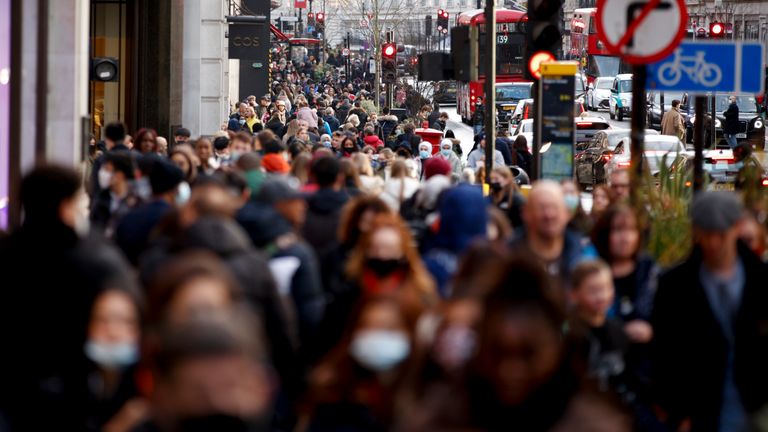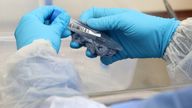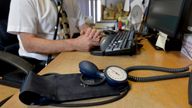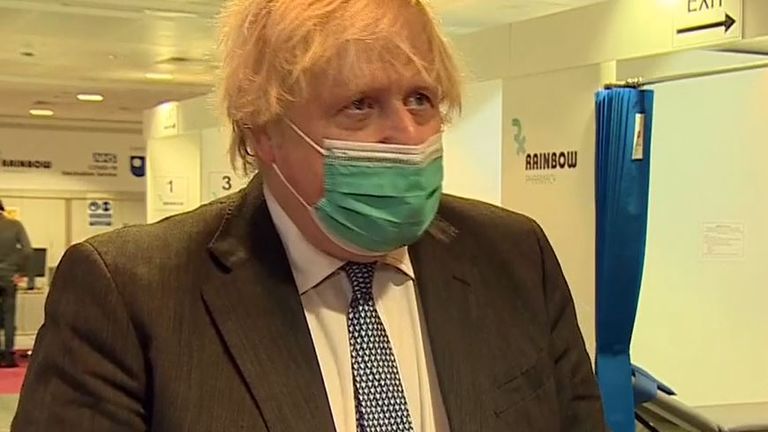COVID-19: More than 90% of community coronavirus cases in England are now Omicron variant, UKHSA says
Today, another 39,923 Omicron cases have been detected across the UK - taking the total number to 210,122.
Wednesday 29 December 2021 20:28, UK
More than 90% of community COVID cases in England are now Omicron, according to latest data.
As it is now by far the dominant variant, the UK Health Security Agency (UKHSA) said it would stop providing Omicron-specific daily updates from 31 December.
Today, another 39,923 Omicron cases have been detected across the UK - the second-highest daily figure so far.
It takes the total number of Omicron cases identified in the UK to 210,122.
Live updates as number of COVID patients in England hits 10,000
The highest daily figure was on 27 December - when there were 45,307. Yesterday, 17,269 were detected.
Scotland has already stopped reporting Omicron cases separately from other COVID cases in daily reports.
Omicron is more transmissible than the Delta variant, but analysis by the UKHSA indicates people with Omicron are significantly less likely to develop severe symptoms.
Early results suggest people are 30 to 45% less likely to go to A&E if they are infected with Omicron rather than Delta.
They are also 50 to 70% less likely to be admitted to hospital.
PM's warning to those not boosted
But the prime minister, on a visit to a vaccination clinic in Milton Keynes, warned: "The Omicron variant continues to cause real problems. You are seeing cases rising in hospitals."
However, he added that Omicron was "obviously milder than the Delta variant" and it meant "we are able to proceed in the way that we are".
Boris Johnson said the jabs campaign had allowed England to maintain its current level of coronavirus controls, and no new restrictions will be brought in for the remainder of this year.
Mr Johnson said 90% of patients ending up in intensive care had not received booster vaccines.
He also said 2.4 million eligible double-jabbed people are yet to take up the offer of a booster, adding: "I'm sorry to say this, but the overwhelming majority of people who are currently ending up in intensive care in our hospitals are people who are not boosted.
"I've talked to doctors who say the numbers are running up to 90% of people in intensive care who are not boosted."
Latest hospital figures
NHS England said 10,462 people were in hospital in England with COVID as of 8am on 29 December. This is up 48% from a week earlier and is the highest figure since 1 March.
In London, 3,310 people were in hospital with COVID on 29 December, up 63% week-on-week and the highest number since 16 February.
During the second wave of coronavirus, the number in England peaked at 34,336 on 18 January.
Data from 21 December showed 71% of COVID patients were primarily being treated for the virus, while 29% were there "with COVID", suggesting they tested positive on arrival for another ailment or tested positive during their stay. Some medics call the latter group incidental COVID patients.
Nightclubs in Scotland and Wales are currently not allowed to open, and the rule of six is in place for pubs and restaurants in Wales.
In Scottish pubs, a one-metre distance must be maintained between tables, groups of people meeting will be limited to three households, and alcohol must only be served at the table.




